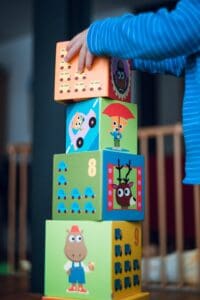Terms to know:
- Milestones: a way to measure normal development. They are certain skills that most children are doing at certain ages.
- Developmental Delay: when a child is not meeting the milestones. In other words, they’re not doing certain things that kids usually do at their age.
There’s something about your child passing a milestone that makes you feel like a successful parent. We burst with pride and want to tell the world! But if your child is not hitting milestones when other children are hitting them, this can feel like failure. But it’s a trick! You are not a failure and your child is not failing. Milestones are a way to mark development. It’s easy to simplify processes like this (and sometimes it’s necessary for clinicians to screen or assess) but development is anything but simple. Development is messy and it is dynamic.
As children grow, they learn new skills.
These skills allow them to move around and interact with their world, connect emotionally with other people, communicate their needs, and learn to take care of themselves.
This is called development.

Of course children develop at different rates, and this is normal. For example:
-
One 2-year old might be talking in complete sentences, while another is just starting to put 2 words together.
-
Some kids start to walk at 10 months and others not until 15 months.
Sometimes these skills might be delayed long enough that you become concerned. If a child is not saying any words by the age of 2, then something might be wrong.
The skills we look for as children develop are in several categories.
Here are some examples of different kinds of milestones:
-
Physical —Things like holding up their head at 3 months old, or sitting up at 9 months
-
Cognitive (thinking and learning) —Skills like imitating a movement at 1 year old or knowing some body parts at age 2
-
Communication —Skills like saying “ba-ba-ba-ba”at 9 months or waving “bye-bye” at age 1
-
Social and Emotional —Skills like laughing at 6 months or showing affection for caregivers at age 1
-
Adaptive —Self-help skills like eating, dressing, or using the bathroom
Milestones are one part of looking at your child’s development. But skills aren’t everything. You are the expert on your child. Use these benchmarks as a framework and decide if you think your child could benefit from seeing a professional. There are therapists who can work with them to help improve some of these skills and move development forward.
If you are concerned about your child’s development, we’ve created a Guide to help you navigate the process. Let us know what you think!




